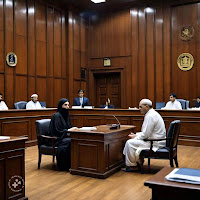Injunction Suits or Stay Order: Types, Procedure, and Legal Implications
Injunction suits or stay orders as we call it in common man language here are pivotal legal actions used to prevent or compel specific actions, protecting rights and interests. This guide explores the types of injunctions, the legal procedure involved, and their profound implications in legal contexts.
Introduction
Injunction suits or suit for stay order in Pakistan are powerful legal tools used to enforce or restrain actions in disputes. This guide provides a comprehensive overview of injunction suits, their types, legal procedures, and the implications they carry in legal matters.
Understanding Injunction Suits or Stay Order
Injunction suits involve court orders that compel or restrain specific actions, protecting rights or preventing harm. They are crucial in resolving disputes where immediate action is necessary to preserve legal interests.
Importance of Injunctions
Here are key points highlighting importance of getting stay order in Pakistan:
- Preventive Measure: Injunctions are often used to prevent irreparable harm or damage before a case is fully resolved. This could include stopping someone from infringing on intellectual property rights or preventing construction that violates zoning laws.
- Preservation of Status Quo: They help maintain the current state of affairs until a legal dispute is resolved, ensuring that neither party gains an unfair advantage.
- Enforcement of Rights: Injunctions enforce legal rights by compelling parties to act in a certain way or refrain from actions that could harm others. For instance, they might compel a company to honor contractual obligations or prevent harassment.
- Emergency Relief: In urgent situations where immediate action is necessary, such as preventing imminent financial loss or bodily harm, temporary restraining orders (a type of injunction) can provide swift relief.
- Equitable Relief: Unlike damages, which compensate for losses after they occur, injunctions provide equitable relief by addressing ongoing or potential harm before it escalates.
- Flexibility: Courts can tailor injunctions to suit the circumstances of each case, ensuring that the relief granted is appropriate and proportionate.
Overall, injunctions or suit for Stay in Pakistan serve as powerful tools in maintaining fairness, protecting rights, and ensuring that justice is served effectively in civil and sometimes criminal matters. Their use requires careful consideration of legal principles and the specific facts of each case.
Types of Injunctions
There are several types of injunctions:
- Temporary Restraining Order (TRO): Issued quickly to maintain the status quo while the court considers whether to issue a preliminary injunction.
- Preliminary Injunction: Granted before or during trial to prevent irreparable harm while the case is ongoing.
- Permanent Injunction: Issued at the end of a trial, ordering a party to take or refrain from taking a particular action indefinitely.
- Mandatory Injunction: Orders someone to do a specific act or compel specific performance.
- Prohibitory Injunction: Prevents someone from doing a specific act or engaging in certain conduct.
- Mandatory Prohibitory Injunction: Combines elements of both mandatory and prohibitory injunctions, requiring someone to perform an act and refrain from certain actions.
- Final Injunction: A permanent injunction issued after the trial and any appeals have been completed.
These injunctions can be used in various legal contexts, including civil disputes, family law, environmental law, and business litigation, among others.
Legal Grounds for Filing
When seeking an injunction, specific legal grounds must be established:
- Likelihood of Success: Demonstrating a strong likelihood of success on the merits of the case.
- Irreparable Harm: Showing that without an injunction, irreparable harm will occur.
- Balance of Equities: Weighing the harm to the plaintiff against the harm to the defendant if an injunction is granted.
Procedure for Filing an Injunction Suit
Here’s a step-by-step guide to filing an injunction suit or suit to get stay order in Pakistan:
- Prepare the Complaint: Draft a complaint outlining the legal basis for the injunction and the relief sought.
- File with the Court: Submit the complaint along with any necessary supporting documents and pay the required filing fees.
- Hearing on TRO: If seeking a Temporary Restraining Order (TRO), request an emergency hearing for immediate relief.
- Preliminary Hearing: Attend hearings where preliminary matters, including the granting of a preliminary injunction, may be addressed.
Court Proceedings
Navigating court proceedings is critical in injunction suits or suit to get stay order in Pakistan:
- Evidentiary Hearings: Present evidence supporting the need for injunctive relief.
- Legal Arguments: Argue legal principles and precedents supporting the injunction request.
- Witness Testimonies: Provide testimony from witnesses to support factual claims.
- Judge’s Decision: The judge evaluates the evidence and legal arguments before deciding on the injunction request.
Evidence and Documentation
Compelling evidence strengthens an injunction suit or suit to get stay order in Pakistan:
- Affidavits: Sworn statements detailing facts supporting the injunction request.
- Expert Opinions: Reports or testimonies from experts validating claims of irreparable harm.
- Photographic or Documentary Evidence: Visual or written evidence demonstrating the harm or violation.
Factors Considered by the Court
Courts consider several factors when deciding on injunction suits or suit to get stay order in Pakistan:
- Likelihood of Success: Probability of the plaintiff prevailing on the merits of the case.
- Irreparable Harm: Seriousness of harm if the injunction is not granted.
- Public Interest: Impact on the broader public interest if the injunction is or isn’t granted.
Granting of Stay Order and Relief
If granted, injunctions or Stay order may provide various forms of relief:
- Cease and Desist Orders: Prohibiting further actions that violate rights or cause harm.
- Mandatory Injunctions: Compelling specific actions necessary to rectify a legal violation.
- Monetary Bond: Requiring the plaintiff to post a bond to compensate the defendant for damages in case the injunction is wrongfully issued.
Legal Implications
Injunctions carry significant legal implications:
- Enforcement: Non-compliance with an injunction can result in contempt of court charges.
- Effectiveness: Injunctions can effectively preserve legal rights and prevent irreparable harm pending litigation.
- Appeal and Review: Parties dissatisfied with injunction orders may seek appellate review to challenge the decision.
Conclusion
Injunction suits or suit to get stay order in Pakistan play a critical role in protecting legal rights and preventing harm in urgent situations. Understanding their types, legal procedures, and implications empowers individuals and organizations in navigating legal disputes effectively.
FAQs
1. What is the difference between a TRO and a preliminary injunction?
A Temporary Restraining Order (TRO) provides immediate relief for a short period, while a preliminary injunction maintains the status quo until a final decision is reached in the litigation.
2. Can injunctions be issued without a prior notice to the defendant?
In exceptional circumstances, such as when immediate action is necessary to prevent irreparable harm, courts may issue injunctions without prior notice to the defendant.
3. How long does an injunction typically last?
The duration of an injunction varies based on its type and the specifics of the case. Temporary injunctions may last until a preliminary or permanent injunction is granted or denied.
4. Can injunctions be enforced across state or national borders?
Injunctions issued by courts generally have territorial limitations, but they may be enforceable across jurisdictions depending on applicable laws and reciprocal agreements.
5. What happens if the plaintiff fails to prove their case at trial after obtaining an injunction?
If the plaintiff fails to prove their case, the injunction may be dissolved or modified based on the court’s judgment in the underlying litigation.

